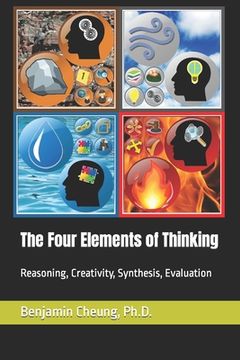The Four Elements of Thinking: Reasoning, Creativity, Synthesis, Evaluation (en Inglés)
Reseña del libro "The Four Elements of Thinking: Reasoning, Creativity, Synthesis, Evaluation (en Inglés)"
Stuck mulling over a problem? It is hard for you to make decisions? Do you struggle to be creative, original and innovative? Are you ever overwhelmed information overload? Do you get thinker's block? The four elements of thinking introduces tools in your thinker's toolbox. This book encourages you to think about the process of thinking. The four elements of thinking introduces a methodical, practical and pragmatic approach to thinking. It associates the four vital aspects of thinking (Reasoning, Creativity, Synthesis, and Evaluation) with easy to remember mnemonics (Earth, Air, Water, and Fire). It presents a system to improve your skills at managing information, decision-making, creativity, reasoning and problem solving. The book encourages shrewd thinking through mental agility and fluency. It will allow you to see new opportunities and solutions by engaging key mental tools during the thinking process. The four elements introduces a method for systematic investigation of the deep study of a subject. Each of the four elements of thinking is comprised of four components. In turn, each of the components is comprised of principles which are tools in a thinker's toolkit. The elements of Earth, Air, Water and Fire remind you to apply Reasoning, Creativity, Synthesis and Evaluation throughout the thinking process. Empedocles from ancient Greece claimed the world was composed of the four elements of Earth, Air, Fire, Water. Consequently, these elements are easy to remember because they are infused into popular culture.EARTH THINKING represents reasoning that is coherent and logical. It is composed of the Evidence, Inductive reasoning, Deductive reasoning and Abductive reasoning components. EVIDENCE is gathering, recording, classifying and processing facts to create a foundation for conclusions. INDUCTIVE REASONING develops principles from the particular to the general. DEDUCTIVE REASONING goes from the general to the particular starting from premises and ending with a conclusion. ABDUCTIVE REASONING draws reasonable conclusions from the available evidence through a hypothesis that accounts for all of the available and reliable facts.AIR THINKING is a proxy for creativity. It is composed of the Investigation, Incubation, Insight and Innovation components. INVESTIGATION builds a foundation of knowledge through curiosity, exploration, inquiry, examination, and experimentation. INCUBATION is the deliberate application of creative thought through contemplation, preparation, and immersive study. INSIGHT is the processing of making a creative leap to a solution spurred from an intuitive understanding a problem. INNOVATION is The deliberate act of creating unique, and original ideas and solutions. WATER THINKING symbolizes synthesis which is composed of the Linking, Perspective, Synthesis and Pivots components. LINKING finds connections and patterns between concepts to reduce a complex problem into manageable parts. PERSPECTIVE develops a framework for thinking by identifying trends and a greater context. SYNTHESIS compares, contrasts and combines to achieve comprehension of how interconnected parts form a whole. PIVOTS find the key aspects of a subject and the most vital elements in a problem. FIRE THINKING stands for Evaluation. It is composed of the Decision, Judgment, Contingency and Validation components. DECISIONS require making trade-offs and identifying selection criteria to make intelligent choices. JUDGMENT arrives at objective, practical, wise and reasonable conclusions through assessment and evaluation. CONTINGENCY PLANS are developed by understanding risks and anticipating failures to adapt to changing circumstances. VALIDATION ascertains the truth by testing for the reliability and credibility of information.

